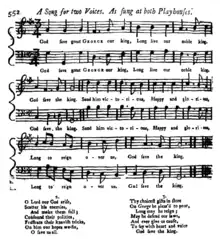God Save the King
"God Save the King" has been the national anthem of the United Kingdom since 1745. Its also the royal anthem of the Commonwealth realms, played alongside their official national anthems.[1][2] Its composer remains unknown to this date.
 Publication of an early version in The Gentleman's Magazine, October 1745. The title, on the contents page, is given as "God save our lord the king: A new song set for two voices". | |
National or royal anthem of
| |
| Also known as | "God Save the Queen" (when the monarch is female) |
|---|---|
| Music | unknown |
| Adopted | September 1745 |
| Audio sample | |
"God Save the King"
| |
When the ruling monarch is a queen instead of a king, the title of the anthem then becomes "God Save the Queen".
The tune for "God Save the King" was used in many countries as a national anthem. Apart from the German state, many of which were linked to Great Britain by marriage, Liechtenstein and Switzerland used the tune. Switzerland changed to a different tune in the 1960s. Liechtenstein still uses the tune.
The tune is also used in America. The famous American song "My Country Tis of Thee" was written in 1831 with the same tune. In the 1930s when the United States was choosing an official anthem the song was a popular choice. "The Star-Spangled Banner" was chosen instead of any other.
Lyrics
Standard version
- God save our gracious King,
- Long live our noble King,
- God save the King:
- Send him victorious,
- Happy and glorious,
- Long to reign over us:
- God save the King.
- O Lord, our God, arise,
- Scatter his enemies,
- And make them fall.
- Confound their politics,
- Frustrate their knavish tricks,
- On thee our hopes we fix:
- God save us all.
- Thy choicest gifts in store,
- On him be pleased to pour;
- Long may he reign:
- May he defend our laws,
- And ever give us cause
- To sing with heart and voice
- God save the King.[3]
Original lyrics: "God Save the King"
Latin verse
- O Deus optime
- Salvum nunc facito
- Regem nostrum
- Sic laeta victoria
- Comes et gloria
- Salvum iam facito
- Tu dominum.[5]
French version used in Canada
Que Dieu protège notre gracieux Roi,
Longue vie à notre noble Roi,
Que Dieu protège le Roi !
Rends-le victorieux,
Heureux et glorieux ;
Que soit long son règne sur nous,
Que Dieu protège le Roi !
Māori version used in New Zealand
- Me tohu e t'Atua
- To matou Kuini pai:
- Kia ora ia
- Meinga kia maia ia,
- Kia hari nui, kia koa,
- Kia kuini tonu ia,
- Tau tini noa.[6]
Origin
Elizabethan Theory
Some people think that the origin of the song comes from the 1500s. The theory is that English composer, John Bull, created the tune of the song in the late 1500s. This idea is one of the more well supported origins of the tune.
King James Theory
Another idea is that the song was created in the 1620s for King James VI & I, but never played before being rediscovered in 1745 and changing 'God save great James our King' for 'God save great George our King'
French Theory
A popular idea in France is that the song is French, being written by French Composer, Jean Baptiste Lully. The theory is that Lully wrote the song, tune and words, for King Louis XIV of France, "The Sun King" in the 1680s, before George Fredrich Handel brought it to England. This idea is not fully evidenced, as much of the proof was shown to be fakes made in the 1800s.
1745 Theory
The most supported and proven answer is that the song was created by someone unknown in 1745 in England, and became famous throughout Great Britain.
References
- https://web.archive.org/web/20140902162152/http://www.royal.gov.uk/MonarchUK/Symbols/NationalAnthem.aspx
- "Isle of Man – nationalanthems.info".
- https://www.royal.uk/national-anthem National Anthem. The Royal Family. royal.uk.
- "God Save the Queen: The History of the National Anthem | History Today".
- God Save the King, William H. Cummings, Novello and Company Ltd, London 1902.
- https://paperspast.natlib.govt.nz/imageserver/periodicals/P29pZD1QSVBJV0gxOTAwMDUwMSZnZXRwZGY9dHJ1ZQ== E Ihowa Tohungia Te Kuini. Te Pipiwharauroa.
